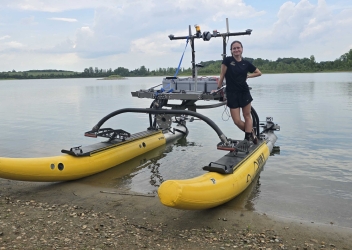Undergraduate and Graduate Research Internships
At CIRP, training the next generation of scientists is one of our core missions and a commitment our research teams fully embrace. Through hands-on, mentored research experiences, our multidisciplinary teams study how and why injuries occur, ways to prevent them, and how to reduce their impact when they can’t be prevented. With research projects spanning many topic areas, we offer rich learning opportunities for undergraduate and graduate research internship participants.
- Who We Are
Our scientists work across disciplines to understand how and why injuries occur, develop methods to prevent them, and reduce their impact when prevention is not possible.
To better understand human behavior, our teams use empirical data to investigate how people think, behave, interpret the world, understand their emotions, make decisions, communicate, and relate to others. We consider the social frameworks that influence individuals, from families to communities to the broader economic and social environment. This may include:
- Assessing knowledge, attitudes, or mental health symptoms through validated questionnaires and surveys.
- Observing interactions with technology, family members, or healthcare teams.
- Developing evidence-based interventions to change behaviors or reduce symptoms.
This research helps our teams define the nature and magnitude of injuries across populations. They identify risk factors, develop accurate estimates of hazard severity, and create tools to track and evaluate prevention efforts. This work allows us to:
- Improve recovery from injury by examining injury-related posttraumatic stress and health-related quality of life.
- Develop evidence-based information and interventions for children who have experienced a range of injuries including youth concussion and violent injury.
We also collect fundamental biomechanics data for children to determine their specific responses and tolerances to traumatic loading environments and to understand how engineering loading during injury events lead to structural injuries and physiological deficits. We also utilize computational engineering methods, including an array of finite element (FE) and rigid body models of the human body, ATDs, and vehicles, to study complex physical and biological systems and their behaviors. Doing so enables us to:
- Design and collect kinematic data from pediatric volunteers under sub-injurious loading conditions, identifying populations at particularly high risk for injury, and determining environmental or social causes underlying these risks.
- Incorporate biomechanics data into computational models of children to increase awareness and compliance with proper restraint practices.
- Help develop and evaluate improved safety designs, technologies, and interventions, directly informing the adoption of evidence-based approaches.
- What We Offer
In the past, our teams have hosted students from programs such as:
- Drexel University undergraduate and graduate cooperative learning internships (“Coops”) in health sciences, electrical engineering, psychology, and English
- Penn University internships in nursing, neuroscience, and public health
- Temple University undergraduate and graduate public health capstones
We welcome potential interns from all universities and colleges.Across research areas, our investigators provide interns with:
- One-on-one mentorship.
- Research methods training, particularly data collection and human subjects interactions.
- Introduction to data science, including real-world data cleaning, analysis, and programming.
- Opportunities to present findings.
- Access to career and professional development opportunities.
- Who We Are Looking For
Internships typically are offered to students enrolled in or recently completed an undergraduate or graduate training program. Typical undergraduate majors include:
- Psychology
- Communications
- Pre-Med/Medicine
- Bioengineering
- Mechanical Engineering
- Engineering
- Computer Science
- Epidemiology
- Public Health
- Behavioral Science
- Others leading to health professions
Typical graduate studies include:- Psychology
- Medicine
- Public Health
- Communications
- Behavioral Science
- Engineering
- Computer Science
- Other Mental Health-related areas
Medical fellows interested in Biomechanics may be appropriate.Though not required, prior experience in data management and analysis and working knowledge of a statistical package are strongly preferred. Examples include:
- SAS
- SPSS
- Stata
- Microsoft Access
- Microsoft Excel
- Matlab
- NVivo
- R/R Studio
- GIS
- Past Examples of Projects
- An example of our work using behavioral science research methods is After the Injury, CIRP’s award-winning website that gives parents the tools they need to help their children fully recover after an injury.
- Preventing injury by promoting safe driving behaviors among teenagers and improving child occupant protection.
- Watch this video to learn about how CIRP engineers are using computational modeling in child occupant protection research
Watch a video about student training at the Center for Child Injury Prevention Studies (CChIPS).
Watch a video about training opportunities with the Injury Science Research Experiences for Undergraduates Program.






